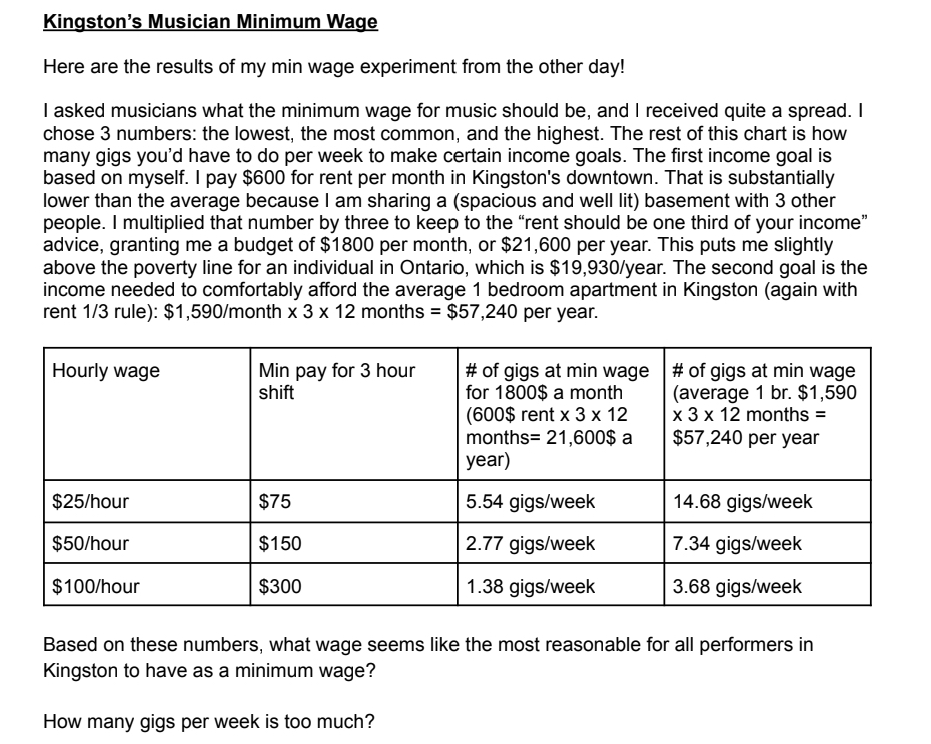Raising the Bar: Music and Labour with Michael Broadhead

If you’ve been to a handful of Kingston’s jazz nights, indie shows, musical theatre productions, or music festivals in the past decade, chances are you’ve heard Michael Broadhead on the upright or electric bass. In the wake of the Labour Day long weekend, I met up with Broadhead to talk about music, labour, and how performing artists can support one another in Kingston’s arts scene.
This interview has been edited for length and clarity.
Broadhead first became interested in musicians’ labour rights when he was studying bass at Humber College. “While I was at Humber, administrators from up the chain were trying to force in some changes. The impression I got from the ground is that the profs, no matter how hard they fought, were essentially being silenced… If no matter how many Juno Awards the profs have, no matter how many musicians they’ve played with, no matter how important they are to the scene, there will be somebody with an MBA who will ultimately be charged with making financial decisions on their behalf—as a community, we’re in trouble.”
This insight informed Broadhead’s perspective when he returned to Kingston. “I was getting validation for my abilities within the classical scene and within the local jazz scene. But influence within the rock scene locally is not tied to your abilities and quality as musicians—it’s very much tied to your utility to other people. And there are a lot of people who invest in trying to make people who make original music believe that it’s not worth what it is.”
One problem with the current landscape in Kingston is the blurred line between DIY spaces and for-profit venues. Broadhead believes that making a distinction between these two sides of the music scene would help both sides to flourish. “I would like to see there become two focused streams of music. One of them is the DIY scene, in which everybody involved profits relatively equally through systems like a profit share, [including] the promoters and the landlords… The other stream is the for-profit scene, and this is where everyone involved should be making a profit. If you are running a business, if you have a place of work, everybody in that place of work should be paid a living wage to do so. If you can’t afford to pay those people a living wage, then you shouldn’t book a show. That’s just an irresponsible decision.”
So, why does nobody seem to mind when for-profit venues pay musicians poorly? “The problem is when that language of opportunity [is] imported into a business. In that kind of situation, musicians are often told that we should be happy for the opportunity. Usually the conversation goes like this: ‘Oh, they only pay this much. Isn’t that frustrating?’ ‘Well, at least they give people an opportunity.’ If I break even, and you make a profit, and I did a night of work, who gave who the opportunity?”
It’s not just musicians who are having these conversations—in February, the City of Kingston introduced the Kingston Music Strategy in the hopes of better supporting the music sector. “It gives us a platform and an opportunity to tell the truth. And the truth is that it’s a labour struggle. I don’t think the City was ready for that framing.”
Broadhead sees a reckoning coming in Kingston’s music scene. “There is a reason musicians get paid so low in this community. It’s because members of this community have been choosing what they pay musicians. And so, if you’re on the side that’s trying to depress musicians’ wages, then I don’t know if your interests are aligned with people that want to raise musicians’ wages. And the City has to go into that conflict, now that they’ve opened the door, and to try and make everyone happy.”
Musicians need to get serious about valuing our labour, and that starts with recognizing ourselves as professionals. “If anybody’s telling you it’s not okay for you to ask for more than what they’re offering, ask them what they pay a sound guy for a normal night. Because they’ll actually know in their head what a reasonable price is for a night of musical work. Music is skilled labour, and the sound person is a great example of somebody with job-specific skills who is getting paid to do a job that the person paying them can’t do themselves.”
When venues don’t recognize the value of your labour, remember that you can walk away. “You get that power from saying no to gigs… saying, ‘I’m not going to play there anymore. And I’m going to tell other musicians that they shouldn’t play there anymore.’ Because that’s actually way more powerful than people would think, which is why people fight so hard against that kind of consciousness… You get more out of building the community of people that respect musicians’ labour and from developing that scene than you do from waiting for somebody to decide you’re a pro.”
If big moves like this feel daunting—if you worry about being perceived as ‘difficult’—you’re not alone. Broadhead recommends taking it in steps. “It’s noticing those moments where you feel invalidated, and then beginning to disentangle, what is the reason for that? Who do you talk to to get help? And if they can’t help you, who do you open up to? Who understands what you’re feeling? Because it’s through finding all those people that you might find the solution. In terms of musicians bargaining for themselves, there is obviously a large element to be done bargaining directly with venues. Usually that’s done through a bandleader. If you don’t feel comfortable talking to your bandleader, talk to another band member. If you don’t feel comfortable bringing it up to them, talk to another musician that you trust in the community.”

While Broadhead’s experience is in the music scene, his ideas apply to writers, visual artists, and theatre-makers, too. “A lesson that theatre can learn from the music scene is that it takes a lot less money and organization than you think to put your work out there. The barriers to entry, especially for something like a locally written and produced theatre piece, are just as low as, say, the barriers to putting out a release show at a friend’s basement for your new EP. Those DIY spaces are where you can actually build the consciousness that says we’re exploited as artists, and that the value we create is for our community first… I think DIY theatre needs to happen more in Kingston, because what I’d really like to see for theatre is to build connection with the DIY music scene.”
Use the budget you have to support artists in your own community. “I think theatre is also held hostage by the idea that you need to get rights for a recognizable show. Every time somebody puts on a community theatre production that purchases rights for a pre-existing show, that usually costs multiple thousands of dollars that goes straight to New York. If you can put on theatre productions with grant money that pay local artists to produce local work, you now have way more budget to put to artists and crew.
There’s a big DIY scene that is just waiting to spring forth in Kingston generally, and we want to welcome in all the other arts scenes, just like the DIY music scene aims to welcome in all musicians.”
Michael Broadhead is a professional bassist in Kingston and an executive board member of the Union of Professional Musicians AFM Local 518. Find him at @michaeluprightbass.
This article was edited on December 1st, 2023 to update formatting.